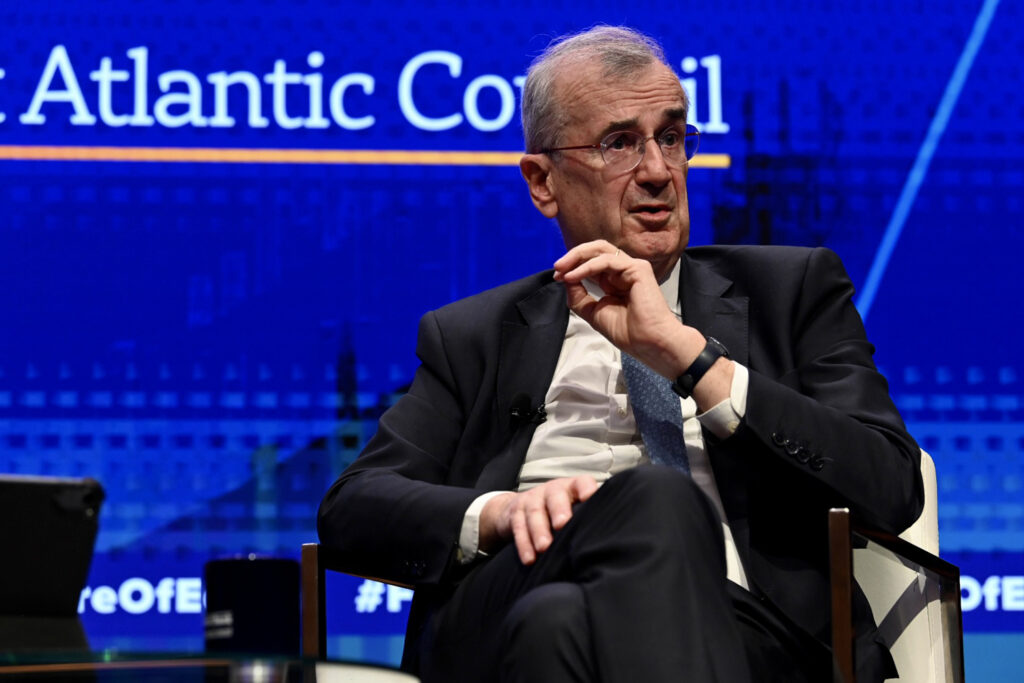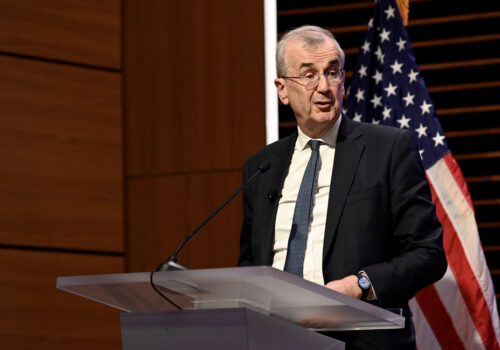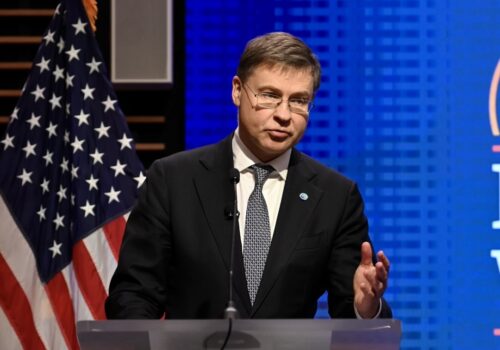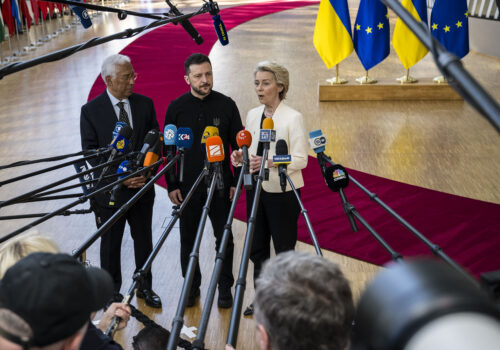Watch the full event
Transcript of remarks
Uncorrected transcript: Check against delivery
Thanks to all of you for welcoming me in the Atlantic Council. We sit just a few blocks from Franklin Park and Lafayette Square. And if necessary, Washington’s geography reminds us of the enduring bond between our two nations.
As the Marquis de Lafayette, probably as famous in the US as in France, hero of the two worlds, once wrote to George Washington, I quote him: “Humanity has won its battle. Liberty now has a country.” From the very start, the cause of liberty, of freedom, has been one we have carried together, across the Atlantic, and I strongly wish it is still today, despite very troubled waters we are sailing through.
Let me also remind you with gratitude that Dean Acheson, who played a key role in the creation of your Atlantic Council, was also instrumental in the early steps of European integration. This is perhaps less well known, but he urged the French government in 1949 and 1950 to take the bold step leading to the Schuman Declaration of 9th of May 1950, and hence of what would become the European Union.
For Dean Acheson, as for many Americans, the EU was not designed, and sorry for the quotation, was not designed to “screw the US,” on the contrary. And let me, by this opportunity, also pay tribute to his French counterpart, Robert Schuman, at that time French Foreign Affairs Minister. He came from the French-German border, Jenna, which you alluded to, and it’s a legacy I feel personally connected to, having grown up like him in that very region where our two nations meet.
Hence, I will highlight that the transatlantic partnership has been so far strong and balanced, as no other worldwide. Second, nevertheless, the US trade policy shift will harm the global economy, starting at home. Lastly, and more positively, I will trace out a path for this possible European moment you mentioned, if, I stress, if we seize the opportunity.
Let me try to state the obvious first, but telling the truth means sometimes reminding the obvious at present. The US and the EU are the world’s two largest economies, maintaining one of the largest bilateral economic relationships. Then there is this question of the trade surplus.
Let me give some figures. If I look at the surplus in goods, obviously, there is a European surplus of $234 billion. But there is a services deficit which has significantly widened in the last years and which is at the advantage of the US for $125 billion. If I add a third element, which is a net primary income flows in favor of US firms, this leads ultimately to a balanced current account.
Can I also add that the effective applied tariffs between the EU and the US were close before recent developments, 3.95 percent for the EU on US products, 3.5 percent for the US on European products. Let me remind also the obvious: Value-added tax, VAT, is not a customs duty. It is levied on the final value of imported and domestically produced goods equally like the sales tax in the US. And nobody would argue in Europe that the sales tax is a customs duty.
European majority-owned affiliates directly employed an estimated [5.3 million] US workers in 2023, and European-based investors represent close to 50 percent of all foreign holdings of US securities that same year.
Last figure, and I will stop there, but only to show how deep, old, and balanced our relationship is: Today, 120,000 European researchers are working in the US universities, labs, and firms.
I must unfortunately go to my second point about the US policy shift and its harmful consequences.
Let me be honest: I don’t mean that the latest globalization wave was a fairy tale. It had its problems. It had its imbalances, both social and financial. But the current lose-lose game will obviously increase these problems and in no way solve them. The new trade measures, tariffs announced, as well as the increasing unpredictability which affects confidence, constitute without any doubt a major negative shock, and self-indicted, to the global economy, but first and foremost, to the US economy. I say that with sadness.
According to all analyses by most US and international banks and yesterday by the IMF, the American economy could suffer this year from an average estimated loss of around 1 percentage point in annual growth less and a similar-sized, 1 point rise in underlying inflation. There could even be a US recession, which was unthinkable, unthinkable, three months ago. But bad news for the US is bad news for all, including for Europe.
According to our preliminary assessments, there could be a direct negative impact of 0.25 percent to euro area GDP growth this year. The impact on inflation remains more uncertain but could be as a whole on the downside. And this is a significant difference; our inflation would diminish while the US one would increase. That said, our baseline scenario for France and the euro area remains that of an exit from inflation without a recession.
Financial markets, as we all know, they reacted very negatively to these trade announcements with a very unusual combination—let me stress that—of a sharp drop in US equity indexes, a rise—very surprisingly—in US long term bond yields, and a broad-based decline in the US dollar. The economic uncertainty may possibly threaten financial stability. I say it with some gravity. And I add that such deeply disruptive effects would also result from attacks on the independence and credibility of central banks. Let me on this occasion express again my gratitude to Fed’s Chair Jay Powell, who admirably shows how a central banker must behave.
One word about monetary policy, if you allow me. Independent from political impatience, our monetary policies are also autonomous from one another across the Atlantic. This in no way precludes—and this is my commitment to you—this in no way precludes a continuous, trusted, and indispensable dialogue, which is more necessary than ever for global financial stability.
But this autonomy is precisely what allows each of us to fulfil our domestic price stability mandate. In Europe, this is made possible by one of the greatest institutional achievements of the [1990s]: the creation of the euro. I am old enough, I must confess, to have been personally in Maastricht thirty-three years ago, and much more recently, I was in Frankfurt last week, for our latest decision to cut interest rates.
There is currently, as I said, no inflationary risk in Europe. And we can almost say “mission accomplished” when it comes to bringing inflation back to our 2 percent target. The significant deceleration of wages is another proof thereof. It is therefore both fair and appropriate that, compared to the US Fed or the Bank of England, the ECB has started cutting rates earlier—last June—faster, and likely further this year.
While this supports activity in the short term, the key to strengthening European growth remains structural through a broader mobilization of our internal resources.
And this brings me to my last and more positive considerations about Europe. Can I first say hope that we use the ninety-day pause to seriously talk across the Atlantic.
The least economically harmful option would be indeed to negotiate and then deescalate the situation rather than setting off a transatlantic spiral of tariff hikes. So far, Europeans, and you could witness it, Europeans have reacted in a remarkably united and calm manner.
Furthermore, I strongly wish Europe and the US can still commit together to what I call a pragmatic multilateralism. I mean a pragmatic multilateralism that is focused on some practical themes of common interest.
Let me name just a few: financial stability, cross-border payments and crypto-assets, cybersecurity, or the fight against financial crime and the prevention of extreme climate events. I insist: Let us resolutely preserve and support the multilateral institutions such as the IMF and World Bank, born and hosted in this great country—and this great city of Washington.
Let me express one final hope. If this difficult current situation has a silver lining, it is to possibly usher the European moment: Europe, despite its limitations—and we are aware of these limitations—as a safe haven of economic predictability and confidence, of rule of law, of social cohesion. But this will not happen without bold moves.
We can already see the impressive shift of the next German government. And these moves are obvious on defense, but let me focus today on economy, as the other pillar of this European moment. We need what I would call a “general mobilization” focusing on three imperatives, three “I”s, taking the best of the impressive economic success of America—or if you prefer, rather than three “I”s, size multiplied by muscle multiplied by speed. What do I mean? And I will be very short, but this is a sum up of the Draghi report, so to say—four hundred pages.
First, we need to integrate, the first “I”, the single market more. This means making the most of its size—as large in GDP terms as the US—by removing internal barriers in several areas such as services and energy. We also need, second “I”, to invest better, giving priority to the most promising breakthrough innovations, particularly those related to AI. And to succeed there, we need to build financial muscle through a genuine Savings and Investments Union, fostering more our abundant private savings—we don’t lack private savings, no the contrary—but we must force them towards equity and venture capital, again, US type. And third “I”: We need to innovate faster. Europe needs simplification, obviously. Less bureaucracy, fewer procedures, and shorter deadlines, while stressing—and this is one of our messages—that simplification is not deregulation, and we will come back to that.
Can I add a general consideration on this European agenda and this European moment: To successfully implement these three “I”s, these three imperatives, we urgently need a binding, visible, and not too distant calendar: Such a calendar will mobilize all our political and economic forces, as did in the past the 1st of January 1993 for the single market, also 1st of January 1999 for the single currency.
Let me conclude, in quoting the great French writer Victor Hugo. He wrote, almost two centuries ago, “A day will come when there will be no other battlefields but markets opening to trade and minds. . . A day will come when these two great groups, the United States of America and the United States of Europe, will stand face to face, reaching out across the seas, exchanging their products, their commerce, their industries, their arts, and their genius.”
That day, alas, has grown more distant in recent times, but we need such nice utopias. The transatlantic sky has darkened considerably. But even in the storm, we must not lose sight of our long-term course. You, the American people, will decide what must be said and what must be fought for on your side of the Atlantic, as loud and clear as necessary. As Europeans, our task is clear: to strengthen our own side of the ocean. Let us, in the very name of the Atlantic spirit this Council embodies, let us seize the European moment.
Watch the full event
Further reading
Thu, Apr 24, 2025
In defense of ‘boring’: A European leader’s message to Trump
Inflection Points Today By Frederick Kempe
EU Commissioner for Economy and Productivity Valdis Dombrovskis spoke at the Atlantic Council in Washington on April 23, making the case for greater predictability.
Thu, Mar 6, 2025
How European leaders are responding to Trump’s approach to Ukraine and Europe
New Atlanticist By
From London and Berlin to Paris and Brussels, European leaders have taken several notable steps this week on security. This follows the blow-up between the Ukrainian and US presidents on February 28.
Fri, Dec 20, 2024
Decoding French economic statecraft
Issue Brief By Charles Lichfield
Understanding how France “does” economic statecraft will be crucial for US and other Western policymakers in the months and years ahead.
Image: Banque de France’s François Villeroy de Galhau spoke at an Atlantic Council event on the sidelines of the IMF-World Bank Spring Meetings on April 23, 2025.




